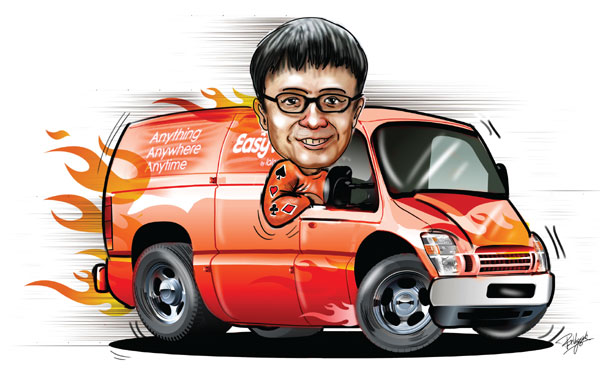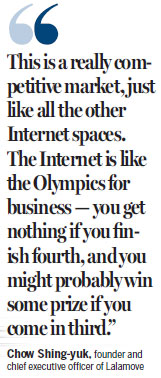From the poker table to the 'Olympics' in business
Updated: 2015-11-12 08:00
By Deng Yanzi in Hong Kong(HK Edition)
|
|||||||||

Editor's note:
Professional poker player-turned-entrepreneur Chow Shing-yuk is battling all the odds to secure a place in the lucrative but highly competitive online logistics business, getting his EasyVan startup venture off the ground in Hong Kong. He says, initially, the company is "burning money" but is hopeful of capturing the "gold medal" eventually.It's half past three in the afternoon, and Chow Shing-yuk is tucking in salad directly from his lunch pack while punching away at his laptop, in an office scattered with Halloween decorations. "This is my lunch ... for almost every day," he says.
Chow, 37, tall and lean, is the founder and chief executive officer of Lalamove, popularly known as EasyVan, in Hong Kong.
Tucked away in a slightly rundown industrial building overlooking a bustling clothing wholesale market, EasyVan is one of Hong Kong's most high-profile tech startups. Its orange logo can be spotted at the rear of some 10,000 vans on the city's roads.

Born and bred locally as Hong Kong's "Uber for vans", EasyVan is an app that matches and connects van drivers directly with customers hoping to deliver goods or move their homes across the city, with a few taps on the phone. It's a challenge to the traditional logistics industry that relies heavily on the less responsive call centers in the city.
EasyVan's on-demand delivery business has grown from a one-man band when it started in December 2013, to a company of 300 employees at present, with operations in Hong Kong, Singapore, Bangkok, Taipei and 10 cities on the Chinese mainland.
Although Chow is now a committed startup founder who eats the same food every day at random hours and flies frequently, his devotion was not always to technology or startups. Before EasyVan, he dedicated seven years of his life to the gaming table as a professional poker player.
Chow started playing Texas hold'em - a card game - online as a hobby and later played professionally in Macao's casinos for almost 16 hours a day.
It was an unexpected career turning point for Chow, who was a former straight-A student in Hong Kong's public exams, admitted to Stanford University to study economics, and then became a management consultant at a top management consulting firm. But, he ultimately quit as the lucrative jobs no longer excited him. He left gambling for the same reason.
Over a seven-year span, he made $5 million off the game, which he parlayed to entrepreneurship as seed money. Rebranding EasyVan as Lalamove, Chow is joining a bigger game - the highly competitive mainland market.

Data from the National Bureau of Statistics show that the mainland's logistics costs in 2014 reached 10.6 trillion yuan ($1.7 trillion), which is one-sixth of the nation's total GDP. Beijing's intra-city logistics market alone reaches 30 billion yuan, according to Li Ruiling, manager of logistics firm 58 Daojia.
When the spoil at stake is a trillion-dollar mainland market, the influx of capital creates a bloody battlefield in the on-demand delivery or logistics offline-to-online (O2O) space.
Earlier this year, Lalamove announced a $10-million series A funding, led by Chinese venture capitalist Crystal Stream, to facilitate its expansion into the mainland market.
Meanwhile, GoGoVan - Lalamove's fellow Hong Kong nemesis - has also announced a $10-million investment for their operations on the mainland. Moreover, among the 200 van-matching applications in the mainland logistics O2O space, more than 20 companies have claimed new funding in the first half of this year, said a report in Shenzhen Economics Daily. "This is a really competitive market, just like all the other Internet spaces. The Internet is like the Olympics for business - you get nothing if you finish fourth, and you might probably win some prize if you come in third," Chow reckons. "There's a huge difference between the gold, silver and bronze medals, and everyone in the industry strives to be that winner."
He admits that, at the moment, EasyVan is "burning money" and will continue to do so for some time. "It'll last at least one or two years. We aim to be profitable in two years," Chow told China Daily.
(HK Edition 11/12/2015 page8)